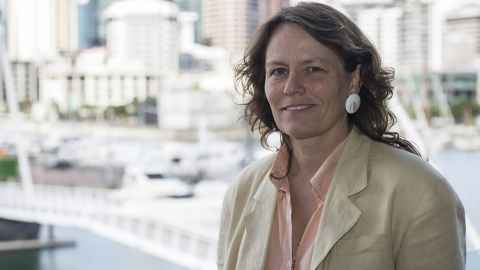Cather Simpson will head body advancing light-based tech
28 August 2024
Professor Cather Simpson's enthusiasm for world-changing technologies like lasers and optic fibre leads to global role.

University of Auckland scientist Professor Cather Simpson will head the global organisation advancing light-based science and technology, such as lasers and optical fibres.
Simpson was elected as the 2025 vice president of the US-based SPIE, the international society for optics and photonics, which means she will serve as president-elect in 2026, and president in 2027.
The not-for-profit publishes 15 journals, runs the world’s largest photonics technologies conference, and supports education to help engineers, scientists, students, and business professionals advance light-based technologies, linking fundamental research and commercial application.
“The cell phone you’re holding in your hand is as much a photonic device as an electrical device,” says Simpson. “The 21st century belongs to photonics in the same way that electronics underpinned the major advances in the 20th century.”
Optics and photonics will play a key role in responding to the world’s biggest challenges, such as climate change and pollution, she says.
The 21st century belongs to photonics in the same way that electronics underpinned the major advances in the 20th century.
Simpson, a professor of physics and chemical sciences at Waipapa Taumata Rau, University of Auckland, is also founder, CEO, and director of Orbis Diagnostics Ltd., a company with a blood-test platform which uses photonics. Since 2022, she has served as a director of Fisher & Paykel Healthcare Ltd., another company relying on the technology.
She was the founder of the Photon Factory, the research facility at the University which has spun out start-ups such as Orbis, and is also involved with the Dodd-Walls Centre for Photonic and Quantum Technologies, headed by Professor Frédérique Vanholsbeeck.
Based in Bellingham, Washington, SPIE lobbies on light technology-related policy, publishes proceedings, books, and journals in the SPIE Digital Library, and offers scholarships, educational resources, and travel grants.
“SPIE is the number one organisation for professionals in optics and photonics, so I’m honoured as all get out to have this role,” says Simpson. She’ll add it to her existing portfolio of responsibilities.
SPIE is short for Society of Photographic Instrumentation Engineers, the original name when the organisation was founded in 1955.
Media contact
Paul Panckhurst | media adviser
M: 022 032 8475
E: paul.panckhurst@auckland.ac.nz